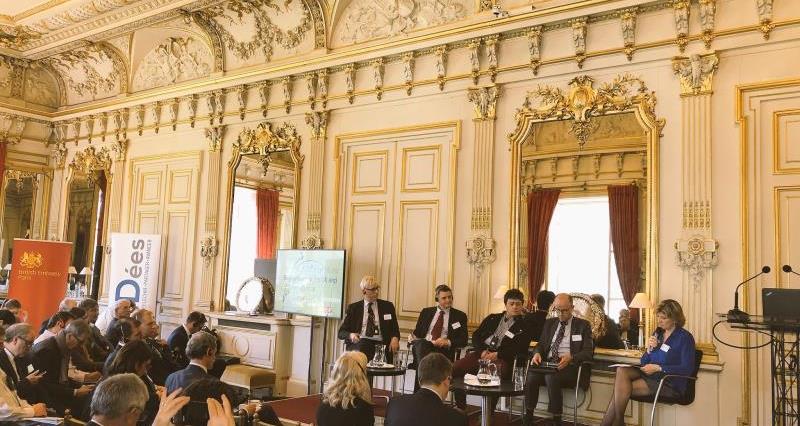He writes:
On Wednesday [7 March], in the luxurious surroundings of the Duke of Wellington’s former residence in Paris, discussions between France and Britain took place about how we can align our respective approaches to the bio-based economy or ‘bioeconomy’.
I had to agree wholeheartedly with the French when they spoke of “lever les freins” – taking off the regulatory brakes – in order to boost agricultural biogas and biofuels. Their presenters appeared to have more real-life and agricultural case studies than our government and research body representatives, who included staff from BEIS, BBSRC and InnovateUK.
I took part in one of the panel discussions alongside Defra and French farmers’ representatives, and highlighted the NFU’s frustration at the slow progress in UK biofuels policy, as well as the regulatory burden that holds back promising non-food crops like industrial hemp.
It emerged that both British and French farmers share ambitious goals for the future growth of AD biomethane plants to help decarbonise heat supply through our respective gas networks. There was agreement, too, that both countries should put in place indicative targets for public procurement and standards for the private sector. This could be done by mandating the use of biodegradeable bio-based fuels, lubricants, working fluids in environmentally sensitive areas.
Our common aim is to support diverse bio-based supply chains based upon tens of millions of tonnes of primary and secondary resources, including both domestic and imported feedstocks.
The French published their national bioeconomy strategy in 2017, while the UK Bioeconomy Strategy is expected imminently. Let’s hope the British Government takes off those brakes and releases that potential!
More information about the bioeconomy:
Primary agricultural biomass and energy crops, as well as wood products, are all part of the bioeconomy, together with co-products, residues and wastes from both food and non-food production. The NFU believes that primary ‘virgin’ bio-based feedstocks are essential in some applications where consumer acceptability or product quality is critically important (e.g. for safety reasons in food packaging), so a strong bioeconomy cannot be built upon secondary resources like wastes alone.
Farmers have access to an abundance of flexible renewable resources, which can provide the raw materials for a wide range of bio-based products, including food, feed, fibre and many different kinds of fuels and chemicals - such as intermediate ‘platform’ compounds like methane, ethanol, ethylene and isobutene. There are further opportunities in engineered or chemically-modified long-lived structural materials like acetylated wood, ‘glulam’, hemp-lime biocomposites, panel products and insulation materials, which need to break into the traditionally conservative construction sector.
If your French is up to it, read the French Agriculture Ministry’s report of the discussion - there are more photos here.
The NFU’s response to last year’s call for evidence on the UK Bioeconomy Strategy can be found here.
